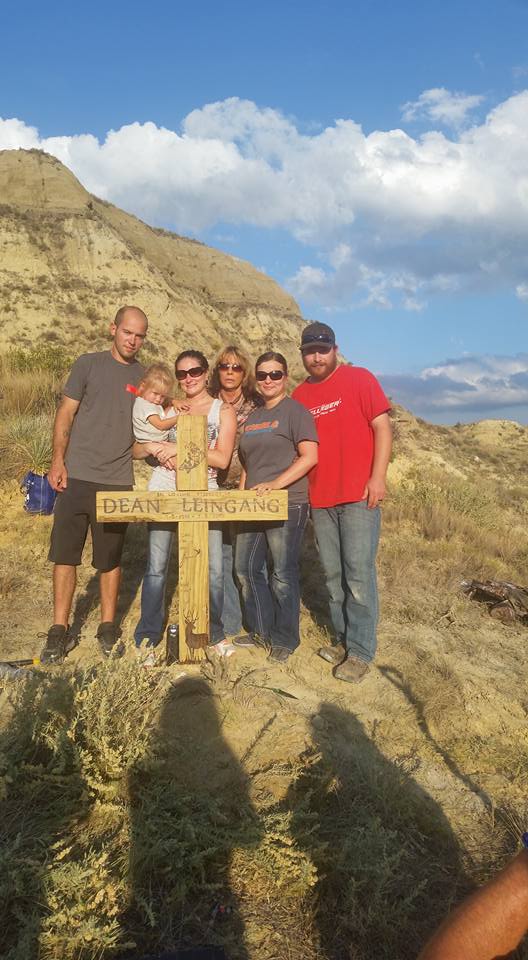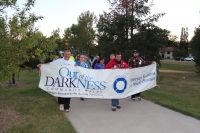By Jody Kerzman
137.
That’s how many North Dakotans died by suicide in 2015.
 Dean Leingang was one of them. His daughter, Ashley Jacobchick, wonders about the other 136.
Dean Leingang was one of them. His daughter, Ashley Jacobchick, wonders about the other 136.
“I am not ashamed. I have never hidden the fact that my dad died by suicide,” says Ashley. “I have never hidden the fact that my dad struggled with depression. If I can help someone by telling his story, then I know I’m doing what he would have wanted me to do. He wanted to make sure others didn’t suffer as he did. And if we saw it, he wanted us to make sure we helped them.”
Dean’s story starts in 2008, shortly after the death of his father. Dean started drinking and going to the bar, habits that Ashley says were out of character for her dad.
“My dad never drank,” she says. “But in 2008, he started drinking. He and my mom ended up splitting up. They were high school sweethearts and had been together for almost 30 years. He went from being a man who would do anything for his family to being a man who couldn’t do anything for himself.”
Ashley quickly found herself playing the role of mother to her 45-year old dad.
“It got to the point where it was affecting me. I had anxiety. He was the last person I thought about every night when I went to bed. I thought ‘is he going to do it tonight? Is he ok? Is he going to drink too much?’ Then every morning, the first thing I did when I woke up was text him to make sure he was ok. It was an obsession and an extremely unhealthy thing to be doing.”
Dean’s battle with depression lasted seven years, from 2008 until 2015, when he ultimately took his own life. It was February 8, 2015. Ashley says the moment she woke up that morning, she knew he wasn’t okay.
“He had been having a tough week. We had been doing some serious counseling and I was really worried about him. He kept telling me he was fine, but that morning I remember I told my sister and my husband I just knew he wasn’t okay,” remembers Ashley. “He wasn’t answering my texts or calls that morning, his phone was shut off, which was unlike him. My sister and I ended up going to his house. He didn’t answer our knocks, and the door was unlocked. He always locked his house. So we called the police. It was kind of cold out that morning, so we sat in my sister’s car while two officers went into check on our dad. Only one came out and he couldn’t look at us. He walked over to the car and said he was sorry, that our dad was gone. A piece of me died that day.”
 It is a moment that forever changed Ashley.
It is a moment that forever changed Ashley.
“It has made me more compassionate, more understanding to what people are going through. I’ve always been a fixer and a nurturer. It’s hard for me to realize I can’t fix everything.”
But Ashley has discovered a new purpose for her life.
“I just knew when it happened, when I lost my dad, that I wanted to be able to help others. I want to share my story and save lives,” she says.
Ashley is doing that by participating in the Out of the Darkness walk. The walk is to remember those who have gone, to help those struggling, and to heal. For Ashley, it is good therapy.
“The support for the walk is amazing,” explains Ashley. “It is amazing to hear other people’s stories and to know that I am not alone.”
 This year’s walk will be the tenth annual Out of the Darkness Walk in Bismarck. Brenda Bergan was one of the driving forces that got the first walk organized. Brenda lost her 16-year-old son to suicide in 2003.
This year’s walk will be the tenth annual Out of the Darkness Walk in Bismarck. Brenda Bergan was one of the driving forces that got the first walk organized. Brenda lost her 16-year-old son to suicide in 2003.
“When you lose someone to suicide, you feel like you’re the only one going through it. The walk shows us we are not alone. It’s an important part of the healing process,” says Brenda.
“We need to educate and raise awareness about suicide,” says Susan Wagner, co-chair of the event. “It’s important to reduce the stigma about suicide. We need to talk about why it happens, what the warning signs are, and how to help people who are on the verge of suicide.”
For many, including Ashley’s dad, depression is the underlying issue.
“My dad left a 12-page note and in one of his first paragraphs he talked about depression. He said depression is a disease that had a hold on him, one he wasn’t sure would ever let go,” says Ashley. “He talked about the times he knew he should have been happy, but instead he would cry.”
Stories like that keep Brenda and Susan working toward education and support. In addition to the suicide support group she runs, Brenda would like to get a depression support group started as well.
“For people who struggle with depression, every day is a battle. This is not a choice they want. No one wants to feel sad, and for some, the only answer is suicide. We need to change that,” says Brenda. “Someone told me shortly after my son’s death if you can bring some good out of the death of your son, you’ll be honoring the life he lived. That’s become my motivation.”
Ashley has a similar motivation.
“If I can help one person, then his death by suicide will not be in vain. I have had many people reach out to me in the months since he passed—some I know and some I’ve never met before—and tell me their stories. I feel I’ve already made a difference, and my dad would be proud of me for that.”
